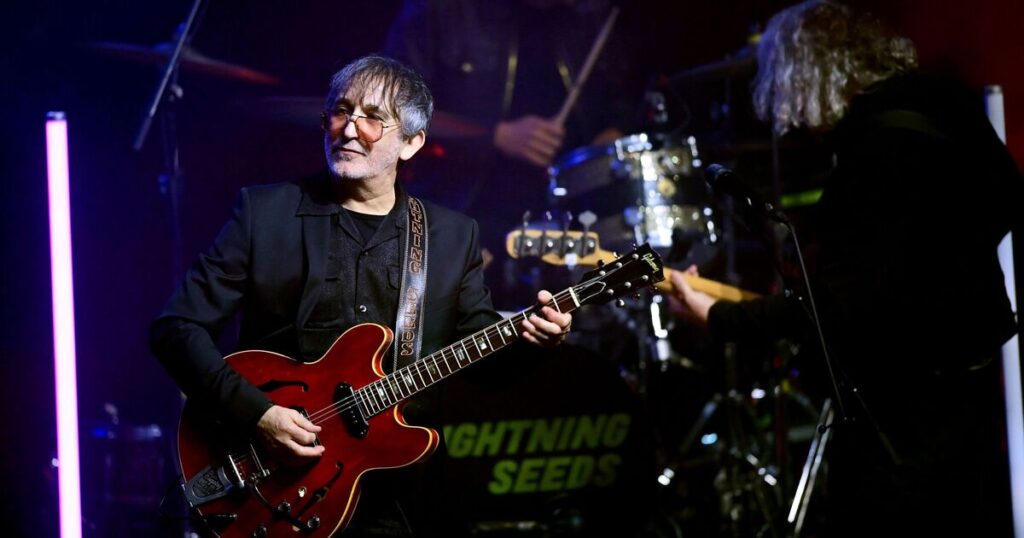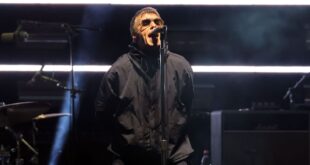
Ian Broudie remembers the first time he was recognised in public. It was the summer of 1989 and the fledgling Lightning Seeds had just appeared on Top Of The Pops for the first time performing Pure – an unfinished song he’d never wanted to release. Broudie, who had been working all day in his small Liverpool recording studio, stumbled into a near-by night garage for sustenance. “Two girls were working there, and one said, ‘Are you that fella that does that song?’,” Ian, 66, tells me in his relaxed Scouse brogue. “Then she told her mate, ‘It’s that fella – he’s really [expletive deleted] rough in real life’.”
Weeks earlier, Pure was about to get its first daytime airplay on Steve Wright In The Afternoon, to an audience of 7.5million people. “I was in my flat in Liverpool, listening to Radio 1, not quite believing it was going to happen,” the amiable singer-guitarist recalls. “My song started playing, then halfway through, Steve took the needle off and said, ‘Hang on, what is this? Who is this? The Lightning Seeds? I’ve never heard of them.’ I thought that was it, that someone had played a cruel joke on me. But then he said, ‘This is fantastic! I’m going to play it again’.” And he did – twice, kick-starting Ian’s career. The dreamily addictive single went Top 20 “and would’ve gone higher if we’d had a label,” he says. Seven years later, Broudie famously co-wrote Three Lions with Frank Skinner and David Baddiel. The anthem that decants the dreams and dashed hopes of English football fans into 3minutes and 44 seconds of buoyant pop bliss has topped the charts three times, selling more than a million and a half copies in the process. Yet Ian is still proudest of Pure.
“It changed my life,” he says. “It’s the best thing I’ve ever done.” And it nearly didn’t happen. Broudie was producing Liverpool indie band The Pale Fountains when the late Dick Leahy, a “loveable music biz rogue”, took a shine to his production skills and asked him to send him some of his own songs. Broudie eventually recorded four of them, including Pure. “I thought it was a bit embarrassing. It was home recorded and there were too many words. I said scrap it but the engineer liked it.” The engineer also included the unmixed track on the demo tape that went to Leahy who loved Pure so much he pressed up 200 singles for radio stations and clubs. John Peel picked up on it first, ahead of Steve Wright, and then Ian then got a call from LA DJ Rodney Bingenheimer who told him Pure was the most requested record in California. “I thought it was a wind-up. I told him, ‘It can’t be, the record isn’t released in America’.” But Bingenheimer had bought a copy on a visit to London, from Rough Trade in Ladbroke Grove, and started the airplay tidal wave that saw the song reach the American Top 40 after MCA picked on it.
Ian was then got asked to mime the song on a German TV show with the band, except there was no band. So he hastily assembled a fake Lightning Seeds line-up with his girlfriend Becky on keys, and pals Lloyd and Chris on bass and drums. On their last night in Germany, the latter pair were enjoying the dubious pleasures of Hamburg’s Reeperbahn, buying hostesses drinks, only to be hit with an eye-watering bill when they tried to leave. Lloyd called Ian saying Chris was being held at knife point until he got the money. Broudie contacted the police and an armed squad bust into the club – to find Chris happily drinking with the hostesses. The disgruntled cops told Broudie the band wouldn’t be welcome in Germany again. But the real Lightning Seeds did return, eight years later in 1997 for an ill-fated live-in-concert TV show. “It was supposed to break us big there. There were 10,000 people at the shows and thousands more watching on TV. We went on stage and put in our in-ear monitors but, when we turned them on, there was just a burst of massively loud white noise, like being stabbed in the ear. It was impossible to play so we just walked off stage. We were drummed out of the country and we’ve never been invited back.”
Born in Penny Lane, just around the corner from John Lennon’s Aunt Mimi, Broudie says the only things he was good at growing up were playing football and playing guitar. As well as the traditional Liverpool influences of Bowie and Bill Shankly, Ian grew up hearing the music his father loved – Sinatra and Nat King Cole. “I didn’t get Sinatra. For me he was an old bloke, and I didn’t get it until later when I saw footage of him singing, It Was A Very Good Year.” The first music that was his, came from the glam rock era, Bowie, Bolan, and Slade. “Then I bought the first Ramones’ album,” he says. “That was an inspiring development. I knew I’d never be David Bowie, Bowie seemed like a god to me, but I might have been able to be the guitar player in Ramones… We did a gig with Bowie in 1995, and I never said hello. I regret that, but I didn’t know what to say. I wanted to write a song with him, but you can’t say that.”
At 15, wandering around Liverpool City Centre, Ian stumbled upon the Liverpool School of Language, Music, Dream and Pun “like a warehouse” where theatrical maverick actor Ken Campbell was staging a play called Illuminatus. “I went in and met Bill Drummond, the stage manager, and by the end of the day I was in the play as a guitarist in the bar. Bill and Jayne Casey asked me to join their punk band, Big In Japan, and I stepped into a world I’ve never left.” The band debuted at Liverpool venue Eric’s where their audience included friends like Pete Burns and Julian Cope. Big In Japan played few gigs and only released half a single but their alumni include Drummond (KLF), Holly Johnson (Frankie Goes To Hollywood) and Pete ‘Budgie’ Clarke (Siouxsie & The Banshees). He recalls playing Wigan Casino and the band driving on to Middlesbrough to see the Sex Pistols in August 1977.
In 1978, Broudie and Budgie bought £12 train tickets to London Euston to try their luck in the Smoke. They hadn’t thought it through. “We were at Euston station for a long time,” he says. “We had no idea where to go. Then we saw a poster for The Clash at the Music Machine, now Koko’s. We’d unloaded their gear at Eric’s earlier so we went there and The Clash guitarist Mick Jones got us in. That was the night Budgie met the Slits and never came back. I mentioned that it my autobiography and got a text from him apologising. The Specials were supporting, and that tour was the first time I met Terry Hall” – the Specials singer who later became Ian’s friend and writing partner. Sense, the song they co-wrote, is one of Broudie’s favourites. Deaf School singer Steve Allen let him stay in his spare room in Kilburn. They soon formed a band together but Broudie has bad memories of that period – “Everyone got ripped off, it happened to me three or four times; I had an American manager who nicked all the money.”
Back in Liverpool, his dreams crushed, Ian ended up producing his pals, Echo & The Bunnymen, and then The Fall. “I was songwriter sidelined into production. It took me five years to catch up.” After Pure, he notched up more Britpop-era hits like Change, Perfect, Lucky You and Life Of Riley, about his son, which became Match Of The Day’s ‘Goal Of The Month’ theme. Riley grew up to be the Lightning Seeds’ guitarist and manager. “After our Coventry gig, Terry told him, ‘I’m so glad that went well. I love your dad but he’s a difficult guy.’ I said ‘You’re Terry Hall and you’re saying I’m a difficult guy!’” Ian admits he gets obsessed with the detail. “I get blinkered. That’s my worst aspect and my best one.”
Their third album, 1994’s Jollification, went platinum. “I’d loved De La Soul’s drum loops but wasn’t sure you could do songs over them. So I got Simon Rogers from The Fall, a musical genius, to co-produce Jollification. He used loops. The songs ended up in the wrong keys, live I had to change the keys.” To date, the Lightning Seeds have sold more than eight million albums. By 2000, that era of the band was over and Ian’s friend Happy Mondays manager Nathan McGough asked him to produce The Coral. “I returned to my youth working with unsigned bands, The Coral and The Zutons. Both ended up having hits. I learnt a lot from them. It re-engaged my love for music.” He pauses and reflects, “I had a hit before I could sing or had a band; I was a producer first, which is definitely the wrong way round. I’m still trying to write a song I’ll be totally happy with. But I’m lucky bastard. I’ve been doing what I love since I was 16.”
*The Lightning Seeds play the Nocturne Live concert series at Blenheim Palace in Oxfordshire (June 19 – 22). Tickets from nocturnelive.com.
 Latest Breaking News Online News Portal
Latest Breaking News Online News Portal






